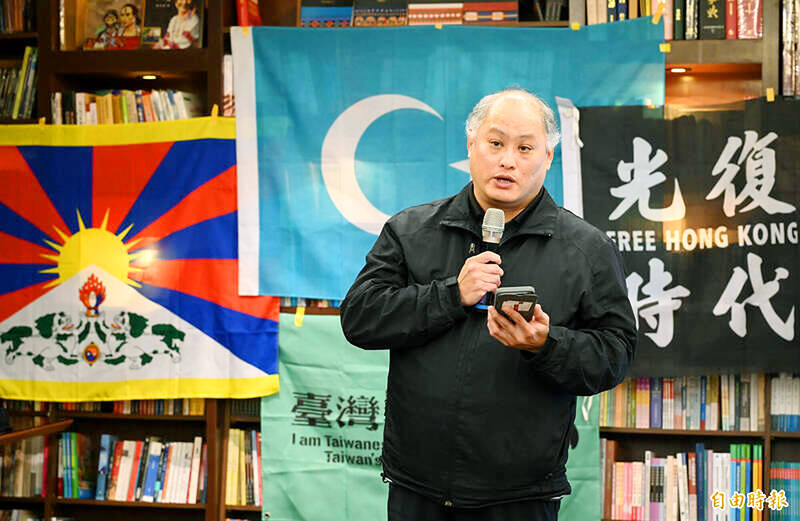Taiwan should reach out to countries that have extradition treaties with China or Hong Kong to prevent the handover of Taiwanese accused of “separatism” or other political crimes by Beijing, human rights activist Lee Ming-che (李明哲) said.
Lee, who was imprisoned in China from 2017 to April this year on a charge of subverting state power, was speaking at a news conference in Taipei to mark Human Rights Day. The event was hosted by Tibetan and Uighur groups, and the “Safeguard Defenders.”
During his incarceration, Lee met several Taiwanese who were imprisoned after being extradited from Spain in connection with telecom fraud, he said, adding that similar extraditions had been granted by Kenya and Malaysia.

Photo: Liu Hsin-de, Taipei Times
These extraditions went against a tacit understanding between Taipei and Beijing that Taiwanese would be repatriated to Taiwan for trial under the Cross-Strait Joint Crime-Fighting and Judicial Mutual Assistance Agreement (海峽兩岸共同打擊犯罪及司法互助協議) signed in 2009, he said.
Beijing’s demand that foreign countries extradite Taiwanese to China compromises the national sovereignty of Taiwan and the extradited individuals’ right to a fair trial and humane treatment in prison, he said.
Following US House of Representatives Speaker Nancy Pelosi’s visit to Taipei in August, China has ramped up pressure on Taiwan, including by authorizing criminal proceedings against pro-independence Taiwanese in absentia and without statutory limits, he said.
Citing an article by Chinese jurist Wang Yingjin (王英津) published in the state-run People’s Daily in August, Lee said that China could invoke mutual legal assistance treaties to target pro-independence Taiwanese in a third country.
That the paper carried the article suggests Beijing is seriously contemplating the strategy, which would endanger all Taiwanese transiting through China or traveling in a country that has an extradition treaty with Beijing, he said.
Lee urged the government to pre-empt China’s abuse of extradition treaties by taking up the issue via diplomatic channels and warning the public against traveling to countries that might comply with Beijing’s extradition requests.
Asked about a remark by Chinese Nationalist Party (KMT) Deputy Chairman Sean Lien (連勝文) that the 2024 presidential election is a choice between peace and war, Lee said that Taiwan would have to acquiesce to Beijing’s “one country, two systems” formula to obtain a guarantee of peace.
Taiwanese must decide if peace at the cost of concessions would be worthwhile, he added.
Separately, Lee said incumbent Taipei City Councilor Wang Hung-wei (王鴻薇) was a “disgrace to Taiwan’s national sovereignty” after she was accused of being a frequent guest on China Central Television’s political talk show Haixia Liangan (海峽兩岸).
Wang is running for the KMT in a legislative by-election for Taipei’s third electoral district.
She is one of many Taiwanese politicians who have appearead on a show that is no more than a propaganda segment for China’s “united front” work in Taiwan, Lee said.
Although Beijing is barred from directly controlling Taiwanese media, entrepreneurs who do business in China can be turned into its proxies, Lee said, adding that the public should be wary of media outlets run by figures with interests across the Taiwan Strait.

CHAOS: Iranians took to the streets playing celebratory music after reports of Khamenei’s death on Saturday, while mourners also gathered in Tehran yesterday Iranian Supreme Leader Ayatollah Ali Khamenei was killed in a major attack on Iran launched by Israel and the US, throwing the future of the Islamic republic into doubt and raising the risk of regional instability. Iranian state television and the state-run IRNA news agency announced the 86-year-old’s death early yesterday. US President Donald Trump said it gave Iranians their “greatest chance” to “take back” their country. The announcements came after a joint US and Israeli aerial bombardment that targeted Iranian military and governmental sites. Trump said the “heavy and pinpoint bombing” would continue through the week or as long

TRUST: The KMT said it respected the US’ timing and considerations, and hoped it would continue to honor its commitments to helping Taiwan bolster its defenses and deterrence US President Donald Trump is delaying a multibillion-dollar arms sale to Taiwan to ensure his visit to Beijing is successful, a New York Times report said. The weapons sales package has stalled in the US Department of State, the report said, citing US officials it did not identify. The White House has told agencies not to push forward ahead of Trump’s meeting with Chinese President Xi Jinping (習近平), it said. The two last month held a phone call to discuss trade and geopolitical flashpoints ahead of the summit. Xi raised the Taiwan issue and urged the US to handle arms sales to

State-run CPC Corp, Taiwan (CPC, 台灣中油) yesterday said that it had confirmed on Saturday night with its liquefied natural gas (LNG) and crude oil suppliers that shipments are proceeding as scheduled and that domestic supplies remain unaffected. The CPC yesterday announced the gasoline and diesel prices will rise by NT$0.2 and NT$0.4 per liter, respectively, starting Monday, citing Middle East tensions and blizzards in the eastern United States. CPC also iterated it has been reducing the proportion of crude oil imports from the Middle East and diversifying its supply sources in the past few years in response to geopolitical risks, expanding

Pro-democracy media tycoon Jimmy Lai’s (黎智英) fraud conviction and prison sentence were yesterday overturned by a Hong Kong court, in a surprise legal decision that comes soon after Lai was jailed for 20 years on a separate national security charge. Judges Jeremy Poon (潘兆初), Anthea Pang (彭寶琴) and Derek Pang (彭偉昌) said in the judgement that they allowed the appeal from Lai, and another defendant in the case, to proceed, as a lower court judge had “erred.” “The Court of Appeal gave them leave to appeal against their conviction, allowed their appeals, quashed the convictions and set aside the sentences,” the judges